What are Decking Screws?
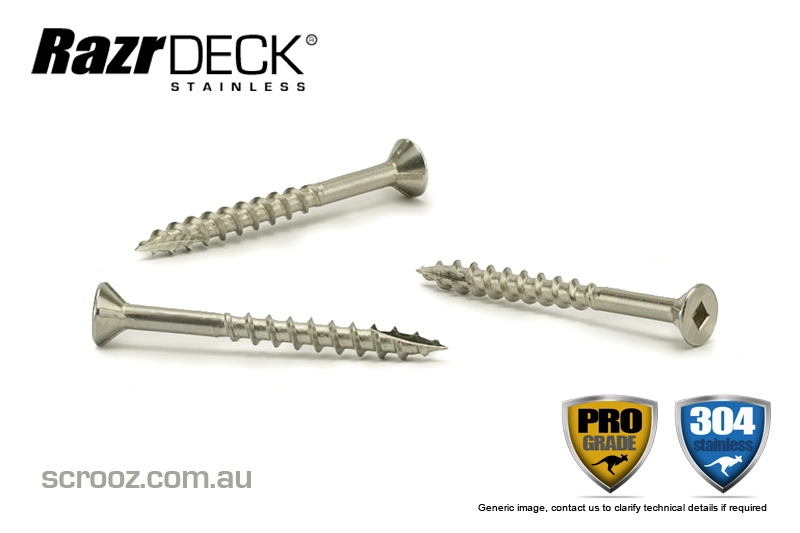
So - What Are Decking Screws?
It's really easy to get bogged down in details when searching for a decking screw and really easy to get completely confused by all the information out there.
Everyone has their own opinion on what works best and these opinions often greatly differ from one another so it's actually rather difficult to get accurate information.
Realistically, there's no particular rules on what manufacturers and suppliers can call deck screws.
We could all technically call any screw a deck screw. If it can be used to fix down timber to timber it could be called a deck screw, I suppose.
With decking becoming so popular over the last 20 years this has caused nearly every manufacturer and supplier to go out and design new an "innovative" features to put on their decking screws to differentiate their particular brand of screw from the rest and give them some form of unique selling point.
This makes it even more confusing when trying to purchase decking screws as now, every screw looks completely different and every screw has some new amazing feature that you absolutely could not possibly screw your deck down without.
So which screw do I choose?
In this article we'll cut through the nonsense and focus on the important parts of a decking screw, which features you should care about and why you should care about them:
- Head Profile
- Self Drilling Point
- Corrosion Resistance
Head Profile
Head type is a very important factor when considering which decking screws to purchase.
Not only will the head be a big factor in holding down your board into your joists but it's also in most cases (unless secret fixed) the most visible part of the screw and has a large impact on the aesthetics of your deck.
The 2 most prominent factors to consider with head profile is:
- What is it going to look like once installed in the boards?
- Is the head big enough for my boards?
What's it going to look like?
We think, this is actually the most important factor to consider. ( i know your thinking "woah i've got 140mm boards that i don't want to cup" - we'll get to that later)
Having gone and spent most likely thousands of dollars on timber and alot of hours installing your deck, it's very important you get a screw your going to be pleased with visually.
Once they're in, they're very difficult to get out so you want to be fairly sure the screws you've chosen your going to like.
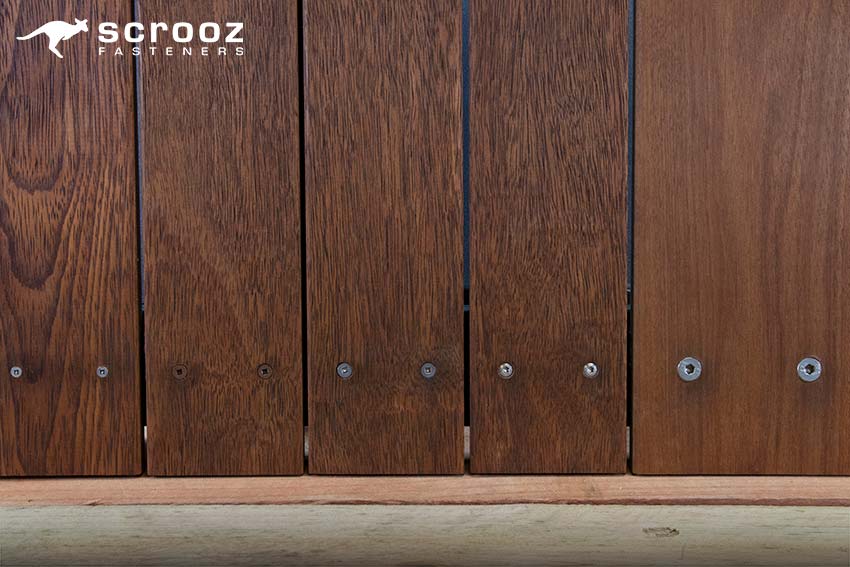
From left to right - the head types are 6G in 90mm boards - 10g coloured in 90mm boards - 10g stainless in 90mm boards - 9g stainless in 90mm boards - 14g in 140mm boards.
Is the head big enough for my boards?
Ok this is a really interesting topic
I'm sure if you've heard "you've got to use this size screw in this size board or it'll cup" before.
It's sort of true, but with alot of caveats. Obviously, no one wants the boards to cup. It looks terrible, it takes a massive amount of work to fix and is generally any deck owners worst nightmare.
Without going into too much detail on the various factors involved in board cupping, essentially the cause of cupping is moisture in your boards.
Moisture gets into your boards and expands them, when the boards expand at an uneven rate they will form a U shape, hence the name cupping.
Now the type of screw you fix your boards down with is a somewhat important factor to reduce cupping, obviously the bigger the head the more hold down power the harder it is for the board to move.
It is by no mean the most important though, in-fact it's rather low down on the list of things you need to be concerned with.
In our experience, if you're boards are cupping, there is a structural or integral problem with your deck that needs to be resolved. Whether you fix with a 14g screw or a 6g screw if you've got tonnes of moisture in the boards there really is no screw that'll solve the issue. You have to get rid of the moisture.
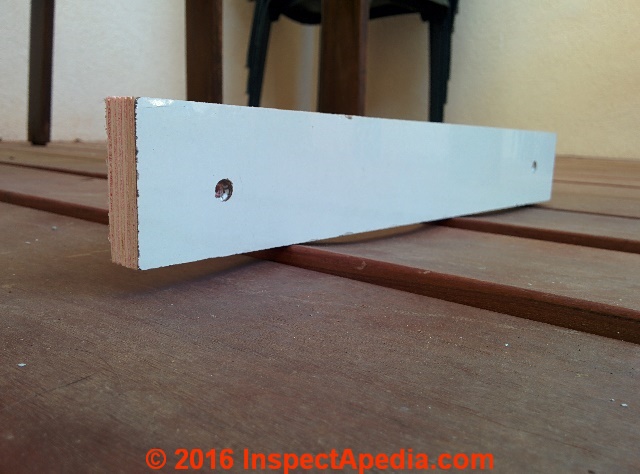
This is why we say it's 'sort' of true. If you've fixed your deck down with 12g or 14g screws because your boards are 140mm wide but you haven't got the proper ventiliation, you havent sealed your boards up and/or your timber is of poor quality, will these screws stop your boards cupping? No they wont.
For instance the difference in head size between a 10g and 12g screw is less than 1mm, this will have very little impact if your boards are not installed correctly when it comes to preventing cupping or warping.
Does a bigger headed screw hold down boards every so slightly better than smaller headed screws. Yes they will.
Is it enough to make a big enough difference to overcome structural or incorrect installation methods. Not atall.
As a loose general rule of thumb, the wider the board the wider head you will want.
If your boards are 90 wide use 6g / 8g or 10g head screws.
If your boards are 140mm wide use 10g / 12g or 14g screws.
Aside from this rough screw guage guide, the most important factors to consider when trying to reduce cupping is how to reduce moisture not particularly the screw head size.
This is the reason we think the first section : What will it look like once installed? Is more of a factor to consider when choosing decking screws.
Self Drilling Point
Ok this is a little easier than choosing head profiles as its all rather simple
Theres primarily 2 types of points that get manufactured for decking screws that you can choose from
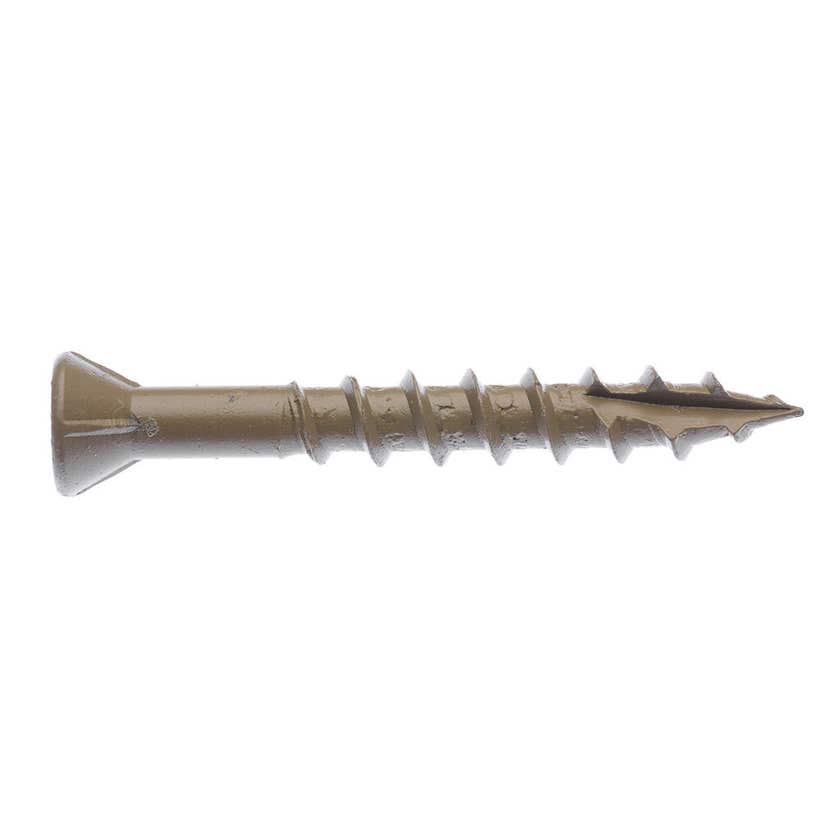
Type 17 Points :
Type 17 are the tried and tested self drilling points when it comes to decking screws. We don't actually know how long this has been around for, at least 60 years we'd guess.
They are a timber self drill point, a sharp pointed design with a cut out flute to help capture and remove the waste allowing a self drilling type function similar to a drill bit.
Super effective on decking screws of all types.
They dont over drill the timber like other tips they drill out just enough so that your thread is getting absolutely maximum purchase.
As the thread is cut into the screw at no point is it any larger than the guage of the screw, meaning every thread will be getting maximum grip into the substrate.
Of the decking screw type tips, this drill point will give you the strongest overall grip and give the screw thread the most purchase.
If we were installing a deck onto a softwood joist and were planning to pre-drill and countersink prior to installation, i'd definitely be using a type 17 pointed screw.
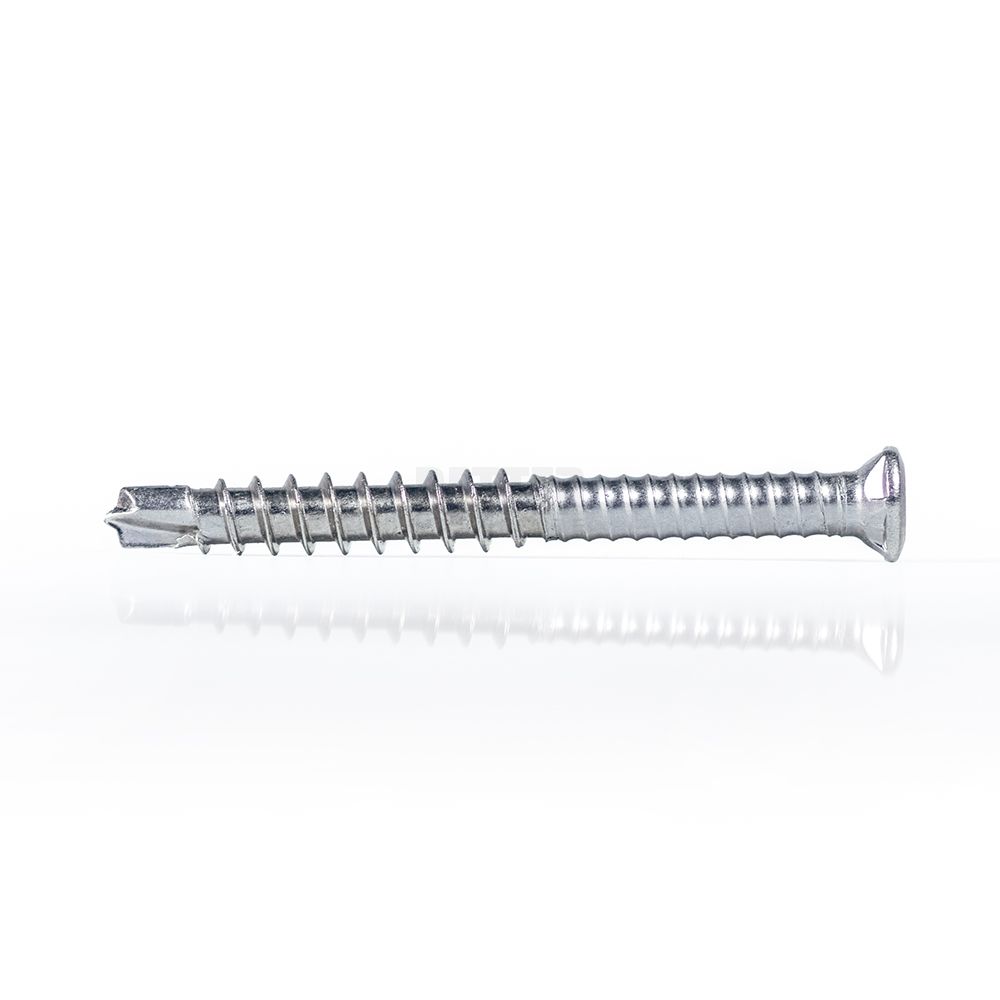
Self Drilling Points:
Self drilling decking screw points have risen in popularity massively over the last few years
They're super easy to use as they will drill pretty much any hardwood timber and usually self countersink the head (depending how wide the tip is)
The reason they're so good at this is that they bore out alot more timber than a type 17 point as theyre being installed.
This leaves less timber for the thread to bite into, reducing torsion during installation therefore reducing snapping and leaving a bigger size hole for the head to sink into, again reducing torsion during installation.
Not all self drill points are equal we should mention, some self drill points are so oversized the thread gets barely any purchase. We've seen some absolutely shocking designs come out of manufacturers over the last 10 years.
Manufacturers walk a very fine line when sizing the self drilling tip, the bigger the tip, the faster clients will install the screws and generally, the more you sell.
Unfortunately though this does come at a cost, the large the self drilling tip, the less timber your thread has purchase on and therefore the weaker the fix.
It should also be noted, as the tips during manufacturing are snipped on, it's extremely difficult to consistently size the tip perfectly. Customers should be weary of self drilling points from lesser quality manufacturers. These inconsistencies can cause big problems down the road if the screws are indeed taking out too much timber.
We would recommend using this type of tip on hardwood joists, as you dont always need maximum thread purchase on very tough hardwood timber joists.
Corrosion Resistance
We're not going to get too deep into this one as this can get super confusing being that every manufacturer calls their coatings some proprietry name
For all intents and purposes when it comes to decking screws, there is essentially 4 levels of corrosion resistance:
Class 3 Hot Dip Galvanised - Very rarely sold anymore. Worst performer on the list when it comes to decking screw coatings, corrosions resistance wise.
Should only really be used in non corrosive environments.
Does have some benefits in that they're a carbon steel base so very strong but with the prevelance now of what we'll call 'trademarked' coatings there really is very little need to purchase HDG screws anymore.
'Trademarked' Coatings - This was hard to categorise initially as most reputable manufacturers now have some form of proprietry coating. Usually some form of ruspert or ceramic coating or a mix of both.
Usually a carbon steel base so very strong torsionally makes installation much easier.
Now these coatings aren't all equal (we have our own coating, obviously we think its better than everyone elses) but for the sake of not making this article 5000 words, most are 1000 hour salt spray tested, massively out perform HDG screws and are a super effective against corrosion.
A really good choice for decking screw coatings, not quite as corrosion resistant in the main versus stainless but still very goods and more than good enough for any non-corrosive environments.
304 Grade Stainless
This would be the most common.
We generally sell 15 time more 304 grade stainless decking screws than any other finish.
Excellent corrosion resistance whilst still retaining some carbon steel for strength. Perfect for nearly all environments with the exception of VERY corrosive environments.
We would recommend using 304 grade stainless in any situation bar 2km off the sea or directly in the splash zone around a swimming pool.
316 Marine Grade Stainless
The most corrosion resistant coating pretty much available.
Barely any carbon steel so these screws are quite torsionally weak but if you are in a super corrosive environment this the go to.
We would recommend using 316 when installing directly in a pool splash zone or within 2km of the sea.
Now there is more coatings out there but those are the main 4.
Please try not to get too bogged down in decking screw choices, use the guide above to help or give us a call on our sales line and any of our staff will be more than happy to help!
If you need more information you can check out our full range of screws here: Screws and specifically our decking screw range here: Decking Screws
Thanks for reading our latest blog entry
Best Regards,
The Scrooz Fasteners Team
